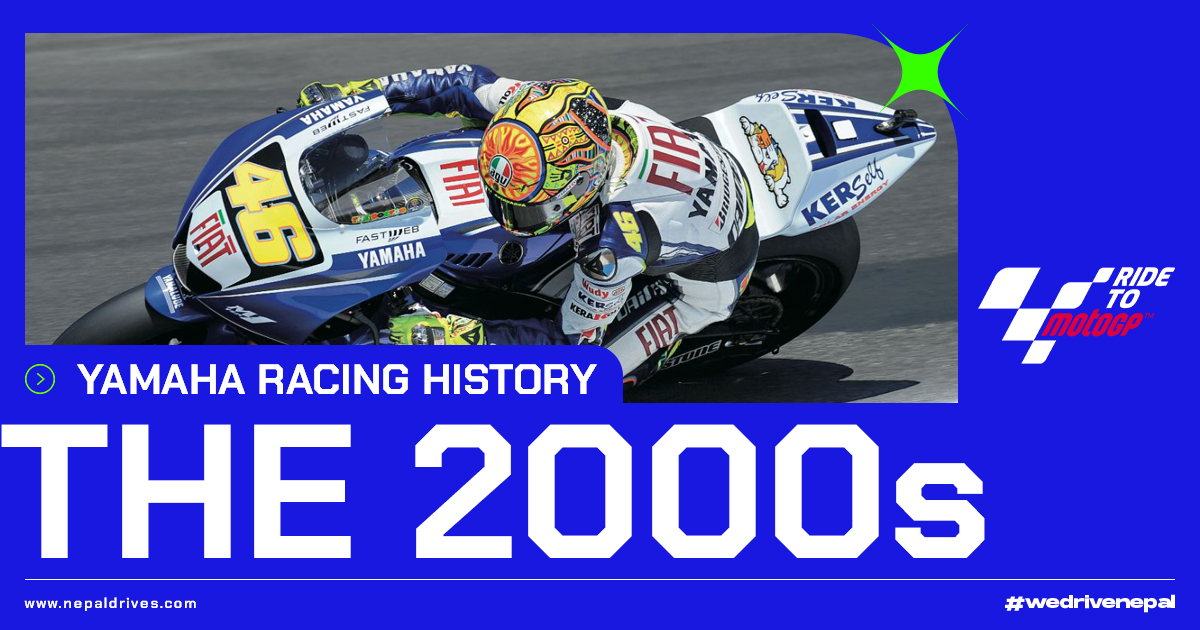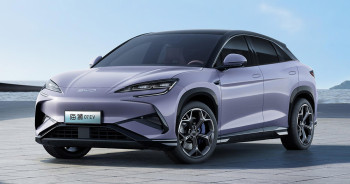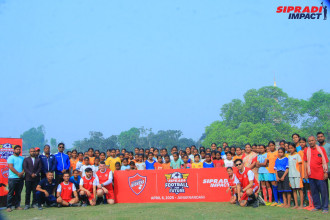With MotoGP’s inception in 2002, Yamaha entered the 4-stroke 990cc YZR-M1 as its factory contender for the new era. Italian racer Massimiliano “Max” Biaggi took several podiums and won the Czech GP and Malaysian GP later that year. These 990cc 4-strokes were the standard until 2006 and over the course of those five years, a major turning point came for Yamaha in 2004.
In the third season of the new MotoGP class, reigning MotoGP World Champion Valentino Rossi made a shock move to Yamaha from Honda. At the time, engineers offered him four engine combinations to test, using either the current 180° flatplane crankshaft or a 90° crossplane crankshaft and with either four or five valves per cylinder. Rossi chose the crossplane crankshaft with the 4-valve configuration, just as Yamaha’s engineers had predicted.
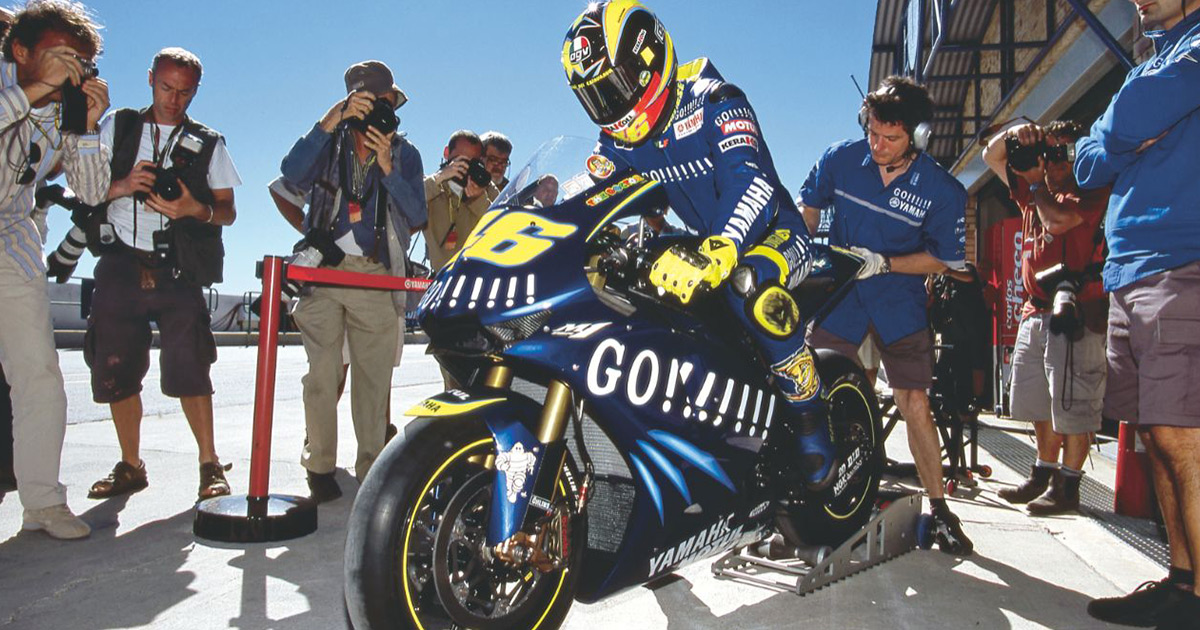 A new Yamaha champion. Valentino Rossi was not only a title contender. He also played a big role in the development of the YZR-M1
A new Yamaha champion. Valentino Rossi was not only a title contender. He also played a big role in the development of the YZR-M1
This moment marked the beginning of Yamaha’s journey to glory and firm presence at the front in the new MotoGP era. His talent for developing a bike as well as his skills in the saddle were instrumental in Yamaha winning back-to-back titles in 2004 and 2005
In 2008, the Fiat Yamaha Team was composed of Rossi and class rookie Jorge Lorenzo, but the two riders used different tire brands, with the Italian running Bridgestones while the Spaniard was on Michelin rubber. Yamaha welcomed the challenge out of respect for the wishes of its riders, striving to offer them competitive machinery that exceeded their expectations, and took demonstrative steps to that end in the 2000s. Rossi clinched a second consecutive title with six victories while Lorenzo won four races of his own and finished as the championship runner-up, giving Yamaha and the YZR-M1 the top two spots for the season.
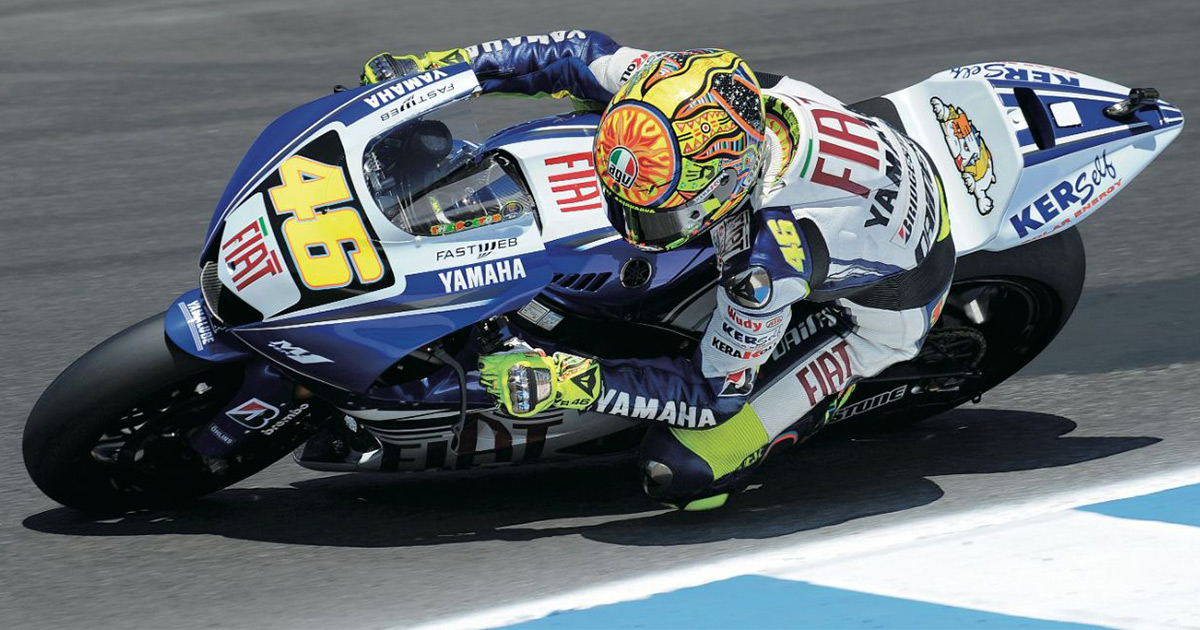 The 2008 YZR-M1 (0WS5) was one of Rossi's favourites. He took nine wins that season and brought Yamaha its second Triple CrownRossi won the championship again in 2008, thanks in part to Yamaha’s efforts to understand the engineering ideals built into the Bridgestone tires he used and conducting extensive engine tuning to extract maximize performance from them. The buildup of data and knowledge acquired contributed to the Italian securing another back-to-back championship in 2009 and Lorenzo’s first championship in 2010, giving Yamaha the premier-class Triple Crown three years in a row.Yamaha’s policy of respecting the ideals of its riders and the philosophies of its official suppliers has been steadfast for generations, and this approach is intrinsically linked to the company’s Monozukuri spirit of excellent quality and craftsmanship that strives to exceed riders’ expectations.The 2000s - The Rossi Era Establishes, YZR-M1 Surpasses Expectations2000 - Yamaha takes back manufacturer's title in 500cc & 250cc classes2002 - Yamaha unveils YZR-M1 as MotoGP era begins2004 - Valentino Rossi joins Yamaha and the title is reclaimed with new YZR-M12005 - Yamaha takes all three MotoGP titles2008 - Rossi reclaims title2009 - Rossi makes it two in a row and Yamaha again wins the triple crown2010 - Yamaha claims rider, team, and manufacturer titles for the third year in a rowStay tuned for more thrilling chapters in Yamaha’s racing history!Source information and imagery: Yamaha
The 2008 YZR-M1 (0WS5) was one of Rossi's favourites. He took nine wins that season and brought Yamaha its second Triple CrownRossi won the championship again in 2008, thanks in part to Yamaha’s efforts to understand the engineering ideals built into the Bridgestone tires he used and conducting extensive engine tuning to extract maximize performance from them. The buildup of data and knowledge acquired contributed to the Italian securing another back-to-back championship in 2009 and Lorenzo’s first championship in 2010, giving Yamaha the premier-class Triple Crown three years in a row.Yamaha’s policy of respecting the ideals of its riders and the philosophies of its official suppliers has been steadfast for generations, and this approach is intrinsically linked to the company’s Monozukuri spirit of excellent quality and craftsmanship that strives to exceed riders’ expectations.The 2000s - The Rossi Era Establishes, YZR-M1 Surpasses Expectations2000 - Yamaha takes back manufacturer's title in 500cc & 250cc classes2002 - Yamaha unveils YZR-M1 as MotoGP era begins2004 - Valentino Rossi joins Yamaha and the title is reclaimed with new YZR-M12005 - Yamaha takes all three MotoGP titles2008 - Rossi reclaims title2009 - Rossi makes it two in a row and Yamaha again wins the triple crown2010 - Yamaha claims rider, team, and manufacturer titles for the third year in a rowStay tuned for more thrilling chapters in Yamaha’s racing history!Source information and imagery: Yamaha



